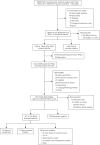Treatment adjustment and medication adherence for complex patients with diabetes, heart disease, and depression: a randomized controlled trial
- PMID: 22230825
- PMCID: PMC3262469
- DOI: 10.1370/afm.1343
Treatment adjustment and medication adherence for complex patients with diabetes, heart disease, and depression: a randomized controlled trial
Abstract
Purpose: Medication nonadherence, inconsistent patient self-monitoring, and inadequate treatment adjustment exacerbate poor disease control. In a collaborative, team-based, care management program for complex patients (TEAMcare), we assessed patient and physician behaviors (medication adherence, self-monitoring, and treatment adjustment) in achieving better outcomes for diabetes, coronary heart disease, and depression.
Methods: A randomized controlled trial was conducted (2007-2009) in 14 primary care clinics among 214 patients with poorly controlled diabetes (glycated hemoglobin [HbA(1c)] ≥8.5%) or coronary heart disease (blood pressure >140/90 mm Hg or low-density lipoprotein cholesterol >130 mg/dL) with coexisting depression (Patient Health Questionnaire-9 score ≥10). In the TEAMcare program, a nurse care manager collaborated closely with primary care physicians, patients, and consultants to deliver a treat-to-target approach across multiple conditions. Measures included medication initiation, adjustment, adherence, and disease self-monitoring.
Results: Pharmacotherapy initiation and adjustment rates were sixfold higher for antidepressants (relative rate [RR] = 6.20; P <.001), threefold higher for insulin (RR = 2.97; P <.001), and nearly twofold higher for antihypertensive medications (RR = 1.86, P <.001) among TEAMcare relative to usual care patients. Medication adherence did not differ between the 2 groups in any of the 5 therapeutic classes examined at 12 months. TEAMcare patients monitored blood pressure (RR = 3.20; P <.001) and glucose more frequently (RR = 1.28; P = .006).
Conclusions: Frequent and timely treatment adjustment by primary care physicians, along with increased patient self-monitoring, improved control of diabetes, depression, and heart disease, with no change in medication adherence rates. High baseline adherence rates may have exerted a ceiling effect on potential improvements in medication adherence.
Figures
Comment in
-
Simplifying care for complex patients.Ann Fam Med. 2012 Jan-Feb;10(1):3-5. doi: 10.1370/afm.1352. Ann Fam Med. 2012. PMID: 22230824 Free PMC article. No abstract available.
References
-
- Saydah SH, Fradkin J, Cowie CC. Poor control of risk factors for vascular disease among adults with previously diagnosed diabetes. JAMA. 2004;291(3):335–342 - PubMed
-
- Bodenheimer T, Berry-Millett R. Care Management of Patients With Complex Health Care Needs, The Synthesis Project. Princeton, NJ: Robert Wood Johnson Foundation; 2009 - PubMed
-
- US Department of Health & Human Services Multiple Chronic Conditions: A Strategic Framework. Washington, DC; 2010
Publication types
MeSH terms
Substances
Grants and funding
LinkOut - more resources
Full Text Sources
Medical
Miscellaneous


